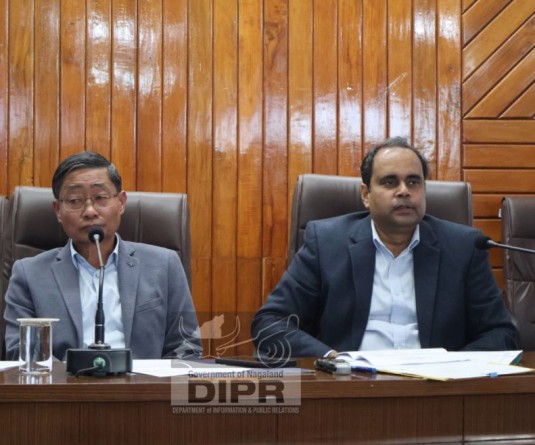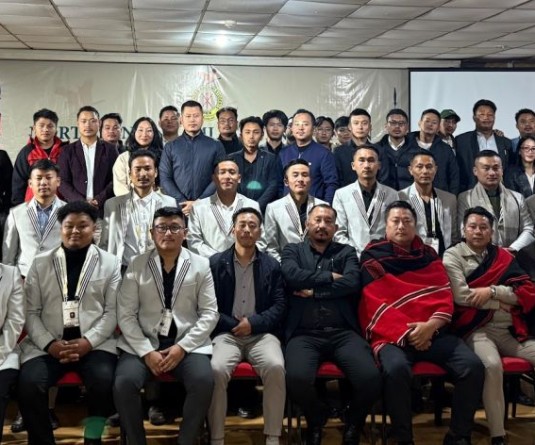
Morung Express News
Kohima | March 22
The Nagaland Health Project Baseline Survey report validation and dissemination program was held on March 22 at the Capital Convention Center here. Nagaland Health Project which started in 2012 is a World Bank financed project and implemented by the Department of Health and Family Welfare.
The baseline survey started on April 15, 2015 and was completed on May 17, 2015. The sample size covered 110 villages, 1642 households, 8,344 individuals and 421 women with a pregnancy in the past two years.
The survey covered various aspects of health in Nagaland such as hospital management and infection control, basic amenities, availability of manpower, equipments, waste disposals and cleanliness in wards, functionalities of operation theaters, infrastructures, health facility management committees, maternal health services etc.
Among those surveyed who had an acute illness or injury, 42% of people sought care outside of the home. In maternal health, “only a little more than half of women had births attended by skilled health personnel” while half received a postnatal care visit within two days of giving birth. Among the women who delivered in an institution, a majority received Janani Suraksha Yojana benefits (76%).
In the past 30 days prior to survey, the ASHA reportedly visited 10% of all households in the sample, whereas nurses (ANMs) visited 8% households.
Majority had a toilet facility on their premise (91%). Most people used a pit latrine inside (42%), septic tank inside (30), or a flush toilet inside (13%). Open defecation is reported by only 3% of the sample. Less than 20% shared their toilet with others, and majority shared with less than ten households.
The Baseline Survey report was signed by Pankaj Kumar, Chief Secretary and Chairman, Project Steering Committee, NHP. Kumar in his speech noted that the NHP can be a model to other states. From the survey, the Chief Secretary pointed out how none of the hospitals has the complete equipments in the State. Kumar thus requested village health committees and doctors to give their 100 percent efforts and urged the involvement of women in all the programs. “Women’s involvement is very important and it will never be a success if women are not involved in the planning,” asserted Banuo Z Jamir, former Chief Secretary of Nagaland. Men do not understand the requirements of women and that is why it is so necessary that women are involved in the planning, she stated. Banuo also pointed out that almost 14 years and communitization should be functioning successfully but we are still trying to figure out. She maintained that communitization is about working and planning together with the whole community.
During the discussion session, members of Village Health Committee from the various districts expressed their concerns in the health centres in the villages. A participant from Tseminyu stated that doctors are not regular in the Health Centres in Tseminyu and so requested for proper accommodation and facilities for medical staffs. “When patients need their service, they are not there and it is very disappointing,” said the representative adding the scarcity of medicines as another major problem. A representative from Jalukie, Peren also complained that the doctors do not come regularly and even when they are stationed the patients are often referred to private hospitals which are beyond the means of the rural poor.
Further complaints were also made on the decrease in medicine supplies in villages and the deplorable conditions of roads which are not safe for sick people to travel. Officials also pointed out the acute shortages of medical specialists in the State where there is only one dermatologist, 6 eye specialists, 5 orthopedic surgeons and 3 radiation therapists in the entire government hospitals in the State.
Some recommendations of the report:
• For medical specialist cadres, it was recommended for increase production of specialists, sanction positions for at least minimum required numbers of specialists in DH, creation of posts of Senior specialists and Junior specialists, introduce rotational postings where specialists spend equal amount of time in both remote areas as well as urban areas.
• For hospitals, creation for casualty departments in all DH, provision of dental services, and increase in production of ophthalmologist were recommended.
• The state has been recommended to own communitization program as its own program and provide fund for its sustainability. Re-sensitization of committee members, including inclusive refresher trainings, on their job responsibilities. Balanced gender participation in the decision making process regarding health, and particularly maternal and child health were further recommended.






